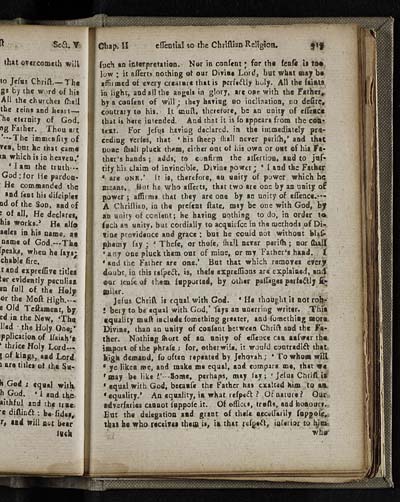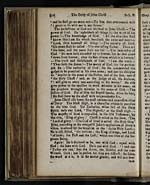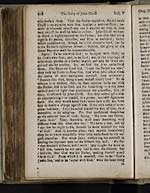1508-1800 > Divinity of our Lord and Saviour Jesus Christ
(323) Page317
Download files
Individual page:
Thumbnail gallery: Grid view | List view

Chap. II eſſential to the Chriſtian Religion. 317
ſuch an interpretation. Nor in conſent ; for the ſenſe is too
low ; it aſſerts nothing of our Divine Lord, but what may be
affirmed of every creature that is perfectly holy. All the ſaints
in light, and all the angels in glory, are our with the Father,
by a conſent of will ; they having no inclination, to deſire,
contrary to his. It muſt, therefore, be an unity of eſſence
that is here intended. And that it is ſo appears from the con-
text. For Jeſus having declared, in the immediately pre-
ceding verſes, that ' his ſheep ſhall never periſh,' and that
none ſhall pluck them, either out of his own or out of his Fa-
ther's hands; adds, to confirm the aſſertion, and to juſt-
ify his claim of invincible, Divine power; ' I and the Father
' are ONE.' It is, therefore, an unity of power which he
means. But he who aſſerts, that two are one by an unity of
power; affirms that they are one by an unity of eſſence.---
A Chriſtian, in the preſent ſtate, may be one with God, by
an unity of conſent ; he having nothing to do, in order to
such an unity, but cordially to acquieſce in the methods of Di-
vine providence and grace ; but he could not without blaſ-
phemy ſay ; ' Theſe, or thoſe, ſhall never periſh; nor ſhall
' any one pluck them out of mine, or my Father's hand. I
' and the Father are one.' But that which removes every
doubt, in this reſpect, is, theſe expreſſions are explained, and
our ſense of them ſupported, by other paſſages perfectly ſi-
miliar.
Jeſus Chriſt is equal with God. ' He thought is not rob-
' bery to be equal with God,' ſays an unerring writer. This
equality muſt include ſomething greater, and ſomething more
Divine, than an unity of conſent between Chriſt and the Fa-
ther. Nothing ſhort of an unity of eſſence can anſwer the
import of the phraſe ; for, otherwiſe, it would contradict that
high demand, ſo often repeated by Jehovah; ' To whom will
' ye likes me, and make me equal, and compare me, that we
' may be like ?' Some, perhaps, may ſay; ' Jeſus Chriſt is
' equal with God, becauſe the Father has exalted him to an
' equality.' An equality, in what reſpect ? Of nature? Our
adverſaries cannot ſuppoſe it. Of offices, truſts, and honours.
But the delegation and grant of theſe necceſſarily ſuppoſe,
that he who receives them is, in that reſpect, inferior to him
who
Set display mode to:
![]() Universal Viewer |
Universal Viewer | ![]() Mirador |
Large image | Transcription
Mirador |
Large image | Transcription
Images and transcriptions on this page, including medium image downloads, may be used under the Creative Commons Attribution 4.0 International Licence unless otherwise stated. ![]()
| Scottish printing towns > 1508-1800 > Divinity of our Lord and Saviour Jesus Christ > (323) Page317 |
|---|
| Permanent URL | https://digital.nls.uk/74618306 |
|---|---|
| Description | Divinity of our Lord and Saviour Jesus Christ, cont. |
| Description | A product of the first printing press set up in Montrose. |
|---|---|
| Shelfmark | L.36.f |
| Additional NLS resources: | |

